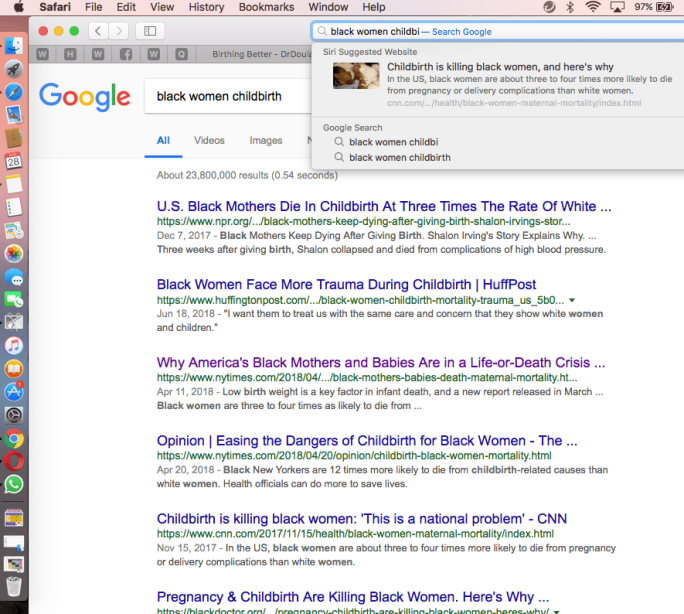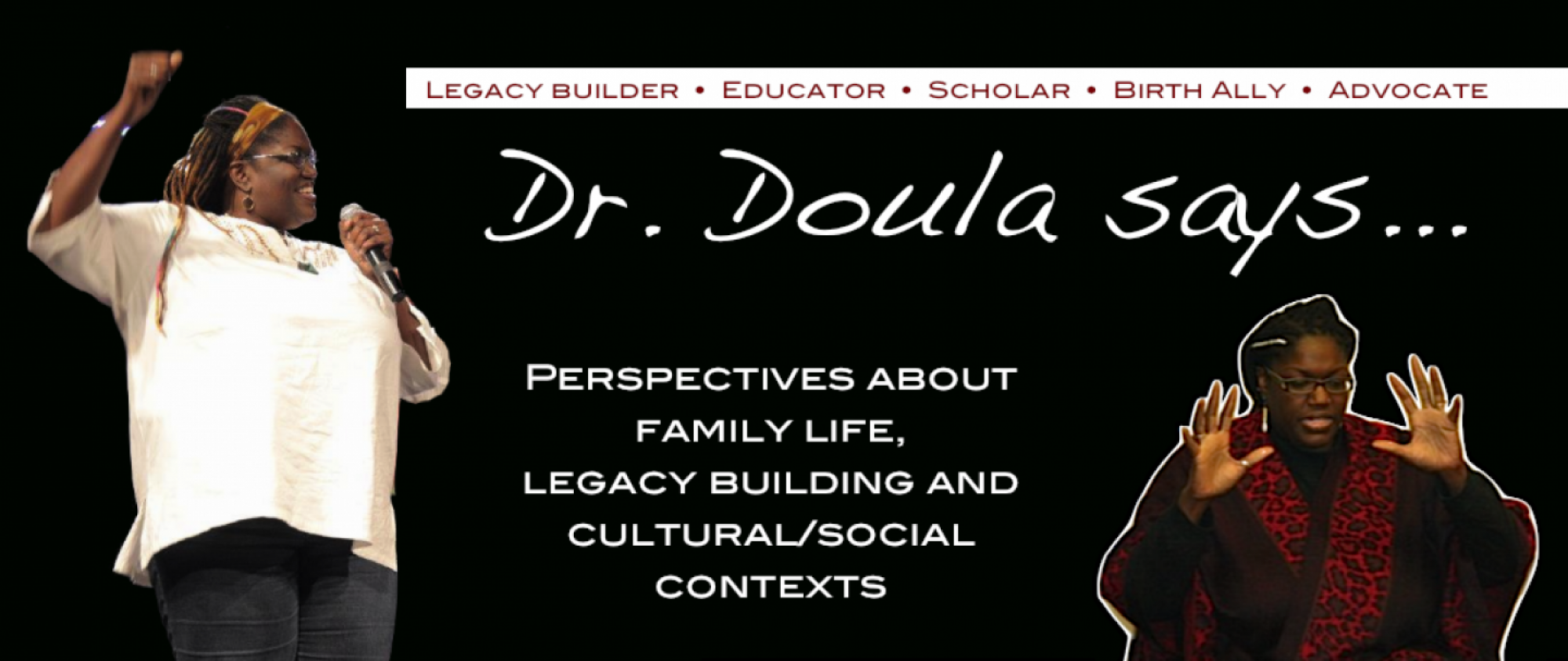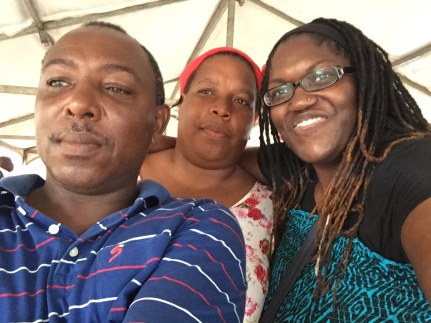After doing a bit of research this morning, I am left wondering: At what point do we move from sounding the alarm about “black women and babies increasingly dying in childbirth”, to becoming complicit in co-creating a narrative that works against Black women, even if it is not our intention. I believe that there is a thin line between the two. Let me explain…
Google “Black women pregnancy” or even better, read the list below… but for the full effect, find a Black teenage girl to read this list to…
-Childbirth is killing black women: ‘This is a national problem’
-Nothing Protects Black Women From Dying in Pregnancy…
-Why America’s Black Mothers and Babies Are in a Life-or-Death Crisis
-Maternal health statistics staggering for black women
-Stillbirth Risk is Higher for Black Women
-How Racism Makes Pregnancy Dangerous for Black Women
-Why Do Black Women Experience More Pregnancy Loss?
-Pregnancy & Childbirth Are Killing Black Women. Here’s Why
-Exploring African Americans’ High Maternal and Infant Death Rates
-Why Are Black Women In The U.S. More Likely To Die During Or After Birth
-U.S. Women Are Dying of High-Risk Pregnancy Complication
-Black mothers are at greater risk for pregnancy + childbirth issues
-Black Women Are 3.5 Times More Likely to Die From Being Pregnant …
-Why Giving Birth Is Deadly for Black Women …
-Black Mothers and Babies at Higher Risk » Black Women’s Health …
-Racism in Health Care – For Black Women Who Become Pregnant, It’s …
-Black women in Virginia die in childbirth at 3 times the rate of any …
-Black Women Face Double the Risk of Pregnancy-Related Heart …
-Why Black Mothers and Babies Have the Worst Birth Outcome in the …
-Why are black mothers and infants far more likely to die in U.S. from …
-Why black women are more at risk of death related to childbirth…
-Study Confirms Black Women Are 3-4 Times More Likely to Die During Childbirth
And these were the only links listed under “African American families” for pregnant Black women provided on a popular pregnancy site classified as “culturally relevant information”
-Black women and pregnancy: Fibroids
-Black women and pregnancy: Sickle cell disease
-Black women and pregnancy: Obesity
-Black women and pregnancy: High blood pressure
Seriously… could someone read this list to a teenage girl and let me know what her response is? (In my mind, I imagine there would be a disclaimer given to her before speaking these types of words to her.) I had my husband google the words and read them out loud and his response was, “What?!” I can only imagine what it would sound like to a African American teenage girl.
Initially, I searched “black women high risk pregnancy” and the above list is what came up on the first four pages. (That’s as far as I desired to go.) I began to wonder if I got those results because of the words “high risk”, so I simplified my search to “black women pregnancy”. The results were about the same and all of the articles were written in 2017 and 2018. (And in case you are wondering, content analysis is kinda my thang as a researcher, so this is intriguing to me.)

I also searched “Latina/Hispanic women pregnancy” and saw similar topics, but articles about pregnancy traditions and culture were also shown.
And then I searched “white women pregnancy” and both the articles about the Black women and the Latina/Hispanic women showed up again. My guess is that those articles about the statistics, disparities and discrimination were using white women as a reference point.
Only when “pregnancy” or “women pregnancy” or “women childbirth” were searched independently did I see the articles about knowing what to expect during pregnancy and childbirth, pregnancy calendars, information about the three trimesters of birth and all of the other things people seek when they are looking for pregnancy resources.
I had been wondering why I had been inundated with so many Black women from around the country who have been contacting me through my website telling me about how they had read about how Black women are dying in childbirth and saying that they felt like they wanted to get involved.
There is a part of me that is thrilled to see Black women inquiring about birth so frequently. I consider this a part of them answering “the call” that is often muffled in today’s culture and society. To me, when these Black women read about their sisters dying and look for ways to get involved, it is evidence of a divine call (of which I am familiar) that is part of a mandate we have always had as Black women in the United States to save ourselves.
However, there is another context that worries me. I know many of us are concerned about raising awareness about what is happening with Black women in birth today. Still, I wonder if we are aware of what is beginning to happen to our narrative via a basic Google search.
Often Black mothers desire to seek resources from a cultural context when they find out they are pregnant. In the words of the women who have contacted me: “I want to be with and learn from women who look like me.” If they search BLACK WOMEN PREGNANCY CHILDBIRTH or any other variation, this is the same list they will see!
There is something about this that vexes me… It reminds me of the saying: “All attention ain’t good attention.” I also heard someone say: “All intentions ain’t good intentions.” This is what concerns me. Beyond the awareness, what are the other intentions for all of this attention?
Okay… periodically, I am prone to a conspiracy theory or two. Tell me what you think about this one. Follow my train of thought…
- Black women are being encouraged to return to the birth profession after half a century of legislation and regulations that almost made them obsolete (but not quite)
- As Black women make their comeback in ALL THINGS BIRTH, the cry of Black women is finally heard and attention is finally turned toward the plight of Black women and babies in birth.
- At the same time that attention is being given to maternal and infant mortality, and how the results are related to systemic racism as well as other stressors that are not as easily identified, Black women are, as a group, labeled HIGH RISK.
- One could argue that the attention that is being given to Black women and babies dying in childbirth could serve as evidence against Black women as so many other statistics are used to confirm pathology in Black people.
- And because people feel compelled to help in any way they can, there are efforts made to make sure that Black women are always offered the “best chance at successful birth”, and that would most likely be with medical doctors, not midwives.
- So then who are the Black women who are moving back into midwifery going to serve? If Black women are classified as “high risk” just because they are Black, how will Black women returning to birth work mean anything more than representation for Black women in the birth field?
- Unless Black women become medical doctors, then they will only truly be supporting Black women as childbirth educators, labor/postpartum doulas, lactation counselors, in support groups, etc.
SERIOUSLY… Talk me off of this limb… How else can I look at this? I welcome and appreciate additional perspectives about this topic.
I do not have any biological daughters, however, I tried to imagine how I would deal with this storyline if I was raising girls. How would I work to counteract this narrative and these words that are repeated and chanted over and over again to Black women almost as if they were affirmations.
I think I would do what I have been doing with the women that have been reaching out to me. I would acknowledge the statistics. And then I would begin to speak directly to the angst that had been conjured up in them after reading so many articles that painted a picture of Black women in America that are pathologically flawed, defective and destined to be unsuccessful in birth. And I would remind them that women of African descent have always faced challenges in this country, but that one major difference between Black women birthing now and in the past is that in the past Black women had knowledge and skills to take care of themselves and each other, even when we were not allowed into medical facilities for anything other than experimentation.
I would say to my biological daughters what I said to my sisters on a stage last year at the 2017 ProDoula “Speak Your Truth” Conference:
WE SAVE OURSELVES!
WE HEAL OURSELVES!
WE DON’T NEED OTHERS TO SAVE US!
YOU ARE THE ANSWER!
ANSWER THE CALL!
I have made that same invitation to Black women and women of color through Sankofa Birth Ambassador (SBA) Workshops as they reach out to me. These workshops are designed for those who feel called to birth, but are unsure where to begin.
At the conference, I challenged the majority white audience of women about how they spoke about us and what they said about us and our historical relationship to birth culture. Now, I am challenging us to be mindful of what we are saying about ourselves and the narrative we are co-writing in our society.
If you happen to be one of those women who ended up on this post because you googled BLACK + WOMEN + PREGNANCY and feel “the call” to get involved in birth so that we can move forward in our efforts to save ourselves, I CAN HELP YOU WITH THAT! (Send me a message on DrDoula.com)
And if you are a sister who is already doing the work and remaining steadfast in the mission of our ancestral mothers who healed our communities and sustained our families with their work as herbalists, midwives and healers with other “knowings”, I stand with you. Thank you for your faithfulness and commitment as you ANSWER THE CALL and provide a light for the paths of those who follow.






You must be logged in to post a comment.